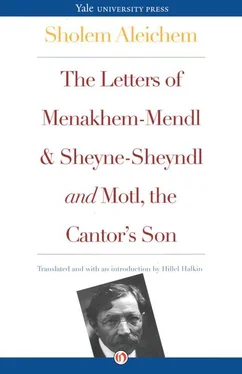That’s because there are so many emigrants. What would we do without them? It’s like living in your own home. Soon we’ll even have guests. Next week, if all goes well, Yoyneh the bagel maker will arrive with his household. And Pesye and her gang are due any day now, too. Things are looking up. God willing, I’ll tell you all about it.
You’ve already met Pesye’s gang. The youngest, Bumpy, is my age. He’s nine, going on ten.
I like Bumpy. The best thing about him is that he’s no crybaby. You can clobber him all you want — he takes it like a sponge. He’s bullet proof! Once he tore a prayer book that Moyshe was binding. Moyshe took his cutting board and whaled into Bumpy so hard that he laid him up in bed for two whole days. It was touch-and-go if Bumpy would pull through. He wouldn’t even eat, that’s how bad it was. Pesye gave him up for dead. Moyshe was beside himself. No more Bumpy!
No more Bumpy, my eye! Don’t think that on the third day he didn’t jump out of bed and eat like a horse. They’re big eaters, Pesye’s gang. “The hungry horde,” she calls them.
Pesye’s a great lady. She’s just a little on the fat side. In fact, she has three chins. I once drew all three on some paper. Bumpy snatched it and showed it to her. Did she laugh! Elye found out and gave me one of his lickings. It’s a good thing Pesye was around. “Don’t make a big deal of it,” she said to Elye. “Boys will be boys.” That’s Pesye! I love her.
I don’t love all her hugging and kissing, though. She was all over me from the minute she arrived in Antwerp. Pesye hugs everyone, especially my mother. You would have thought it was my father come back to life, the way my mother cried when she saw Pesye. She kept it up until Elye warned her that she’d never make it past the doctor.
Everyone in Antwerp has to see the doctor. The first question you’re asked is either, “Have you been to the doctor yet?” or, “Well, what did the doctor say?” If you don’t go by yourself, you’re sent by Ezrah. Our first time there my mother began telling her whole story — how her husband was a cantor, and how he caught cold and fell ill, all the way to our stolen linen. How could we go to America without it?
Fraulein Seitchik wrote it all down. My mother was just warming up when someone asked:
“So you’re going to America?”
“Where else?” we answered. “To Yehupetz?”
“Have you been to the doctor?”
“What doctor?”
“Here’s his address. He’ll check your eyes. That’s the first order of business.”
My brother Elye heard “eyes,” looked at my mother, and turned white as a sheet.
We hurried off to the doctor. Everyone except my mother. She’d see him another time. Elye was worried about her. All that crying hadn’t done her any good.
The doctor examined our eyes, wrote something down, signed it, and put it in an envelope. We thought it was a prescription and were scared. “What’s wrong with our eyes?” we asked, but he just pointed to the door. We reckoned that meant it was time to leave and took the prescription to Ezrah. Fraulein Seitchik opened the envelope, read it, and said:
“Good news! The doctor says your eyes are fine.”
Good news was right! But what about my mother? She was crying even now. “What are you doing?” we asked. “The doctor will flunk you!”
“Don’t I know it! What do you think I’m crying for?”
So she said, my mother, putting a hot compress on her eyes. It was given her by a barber-surgeon, an ugly puss of an emigrant with weird teeth, a dandy’s gold watch chain, and a name that sounded like the looks of him: Beeber!
Beeber came to Antwerp with Pesye and Moyshe. He met them on the way and ran the border with them. They didn’t have adventures like ours. No one tried killing or robbing them. Still, they had a rough time. You should listen to some of their stories.
Were they put through the grinder in Hamburg! It could make your hair stand on end. Why, Sodom is a resort town next to Hamburg. They treat emigrants no better than convicts there. If Beeber hadn’t saved the day, they would never have gotten out of it alive. He’s a terror, Beeber is. Did he put those Germans in their place — and without knowing a word of German! But he does speak a swell Russian. I’ve heard it said he knows more Russian than Pinye.
Pinye says Beeber’s stories would be even better if they were true. He didn’t cotton to Beeber from the start. He’s even written a poem about him. When Pinye takes exception to someone, he puts it in rhyme. I can recite it for you:
Beeber the medic
Can give you a headache
By telling a story
Ten times or more. He
Swears it’s all true,
But between me and you,
Even his small talk
Is just so much tall talk!
Beeber has promised to cure my mother’s eyes. He’ll see to it, he says, that no one finds anything wrong with them. He learned the trick of treating eyes back in Russia. And he’s been in Germany and watched the doctors there. They can make the blind see, that’s how good those German doctors are.
“Are you sure they don’t do the opposite?” Pinye asked. Beeber blew his stack (he has a temper, Beeber does) and gave Pinye hell. Pinye, he said, is a wise guy. Wise guys don’t get far in America. Americans, Beeber said, don’t like monkey business. They say what they mean and mean what they say. A man’s word is sacred there. America is built on truth and honesty and justice and integrity and humanity and loyalty and compassion and …“You’re sure that’s all?” Pinye asked. That only made Beeber madder. It’s a shame the conversation was interrupted.
How come? Because someone came to tell us people were looking for us. Who can it be? Guests! Special guests! Yoyneh the bagel maker and his family have arrived. A new gangful! We go through the whole song-and-dance. First Brokheh kisses her parents. Then Elye kisses his in-laws. Then Pinye kisses his friend-in-laws. Then Beeber kisses them too. “Who’s this?” Yoyneh and his wife want to know. “I’m Beeber,” says Beeber. Pinye begins to laugh. My mother cries. Elye squirms. He glares at my mother and tugs his beard. But there’s nothing he can say. If you can’t spare a few tears for your in-laws, for whom can you?
“How did you run the border? Who stole your things and where?”
That’s our first question. They have a bunch of stories for us. But I don’t have the patience to listen. I go off to a corner with Alte.
Remember Alte? She still has two braids and looks like a bagel twist but she’s gotten older. I told her about Goldeleh, and about my friends Mendl and Big Motl, and about Ezrah and Fraulein Seitchik, and about the doctor who looks at your eyes. From there I went on to Vienna, and the Alliance, and Cracow and Lemberg, and running the border and saving our lives. I didn’t leave anything out.
Alte listened and told me her own story. Her father had been wanting to go to America for some time. Not her mother Riveleh, though. That is, it was Riveleh’s family that was against it. They said you had to slave in America and Riveleh wasn’t used to hard work. But after she and Yoyneh went bankrupt and their creditors started knocking on the door, there was nothing to do but sell everything and go.
There was one thing Riveleh refused to part with: a chemise Yoyneh had bought her back in the days when business was good. “What do you need a chemise for? Who wears them in America?” Yoyneh asked. “What do you mean, what do I need it for?” answered Riveleh. “For years I dreamed of a chemise, and now that I have one you want me to sell it?” Day and night that chemise was all they talked about. Riveleh’s family took her side. She and Yoyneh fought all the time. It almost led to a divorce.
Читать дальше












